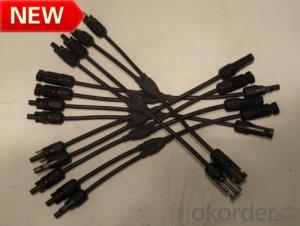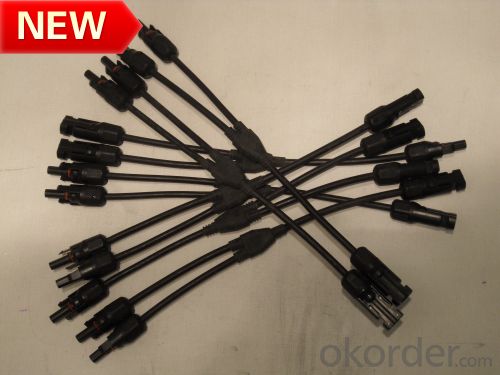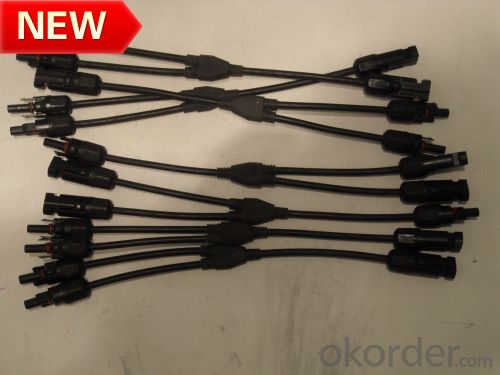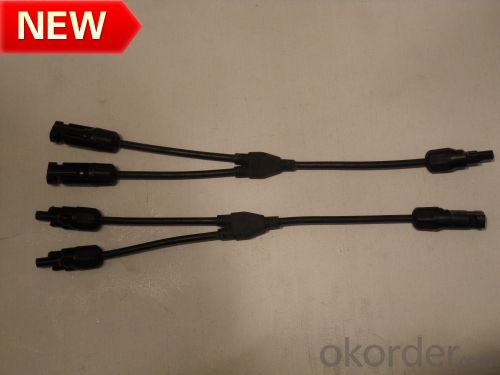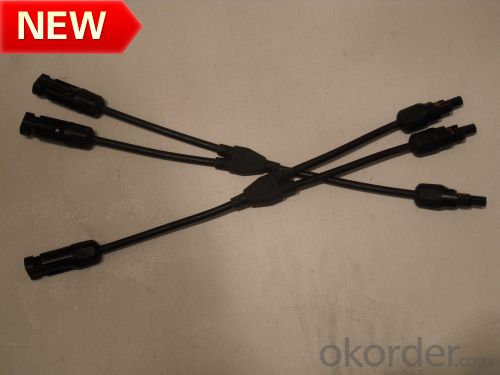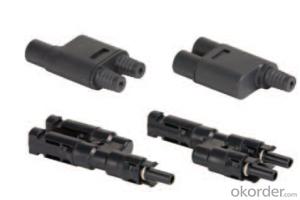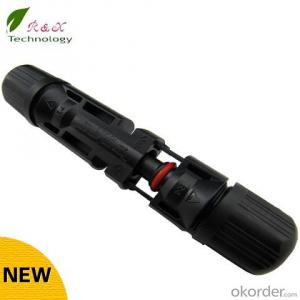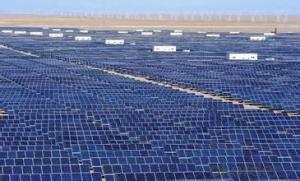Sells Solar Energy Systems PV System Branch Connector R4Y for PV Station
- Loading Port:
- Guangzhou
- Payment Terms:
- TT OR LC
- Min Order Qty:
- 50 set
- Supply Capability:
- 50000 set/month
OKorder Service Pledge
OKorder Financial Service
You Might Also Like
Brief introductions of product:
Connector R4Y System for photovoltaic adopts contact and insertion of reed with inner-knob type.It is used with male and famale points.pv junction box and cables made of elastomeric material and makes contact and isertion more certified by IEC61215 and TUV 2PFG1161.
Mainly parameters of product:
Rated voltage 1000V DC
Rated current 30A
Test volaage 6KV(50HZ,1min.)
Ambient temperaure range -40°C...+90°C
Upper limiting temperature 105°C
Degree of protection,mated IP67
unmated IP2X
Contact resistance of plug connectors 0.5m?
Safety class II
Contact system R4 Multilam
Type of termination Crimping
Contact material
Copper,tin plated
Locking system Snap-in(R4)
Cable type PV-F 1169 1*4mm2
1*6mm2
Design paper of product:
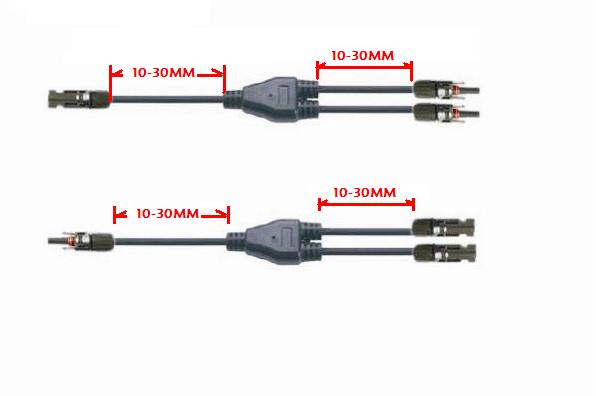
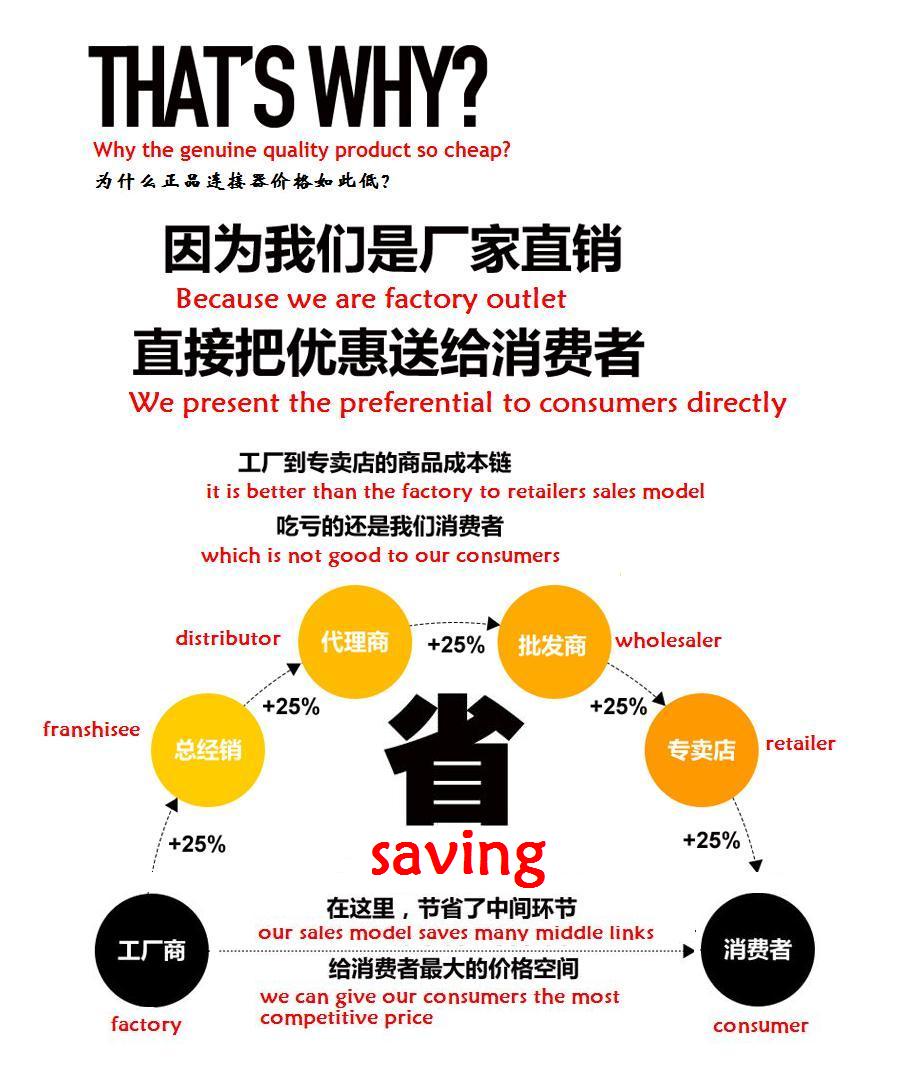
- Q: How does the efficiency of solar panels vary based on the angle and orientation?
- The efficiency of solar panels may vary depending on the angle and orientation they are positioned in. The performance of solar panels can be significantly impacted by the tilt angle at which they are set. It is ideal to position solar panels at an angle that allows them to receive maximum sunlight exposure throughout the day. The highest efficiency of solar panels is achieved when they are oriented perpendicular to the sun's rays. This means that solar panels should directly face the sun without any obstruction or shading. When solar panels are properly angled, they can capture the maximum amount of sunlight, resulting in higher energy production. The orientation of solar panels also plays a vital role in their efficiency. In the Northern Hemisphere, solar panels should generally face south to receive the most sunlight. Facing south allows panels to receive sunlight for the longest duration during the day. However, in the Southern Hemisphere, solar panels should face north for optimal efficiency. Improperly angled or oriented solar panels can experience a decrease in efficiency. If panels are tilted too steeply or too shallow, they may not receive the maximum amount of sunlight. Similarly, if solar panels are not facing the correct direction, they may not efficiently capture sunlight. It is important to note that solar panels can still generate electricity even if they are not perfectly angled or oriented. However, their efficiency will be lower, resulting in a lower energy output. Factors such as temperature, dust, and shading from nearby objects or trees can also affect the efficiency of solar panels. To maximize the efficiency of solar panels, it is advisable to seek professional consultation. Experts can assess the specific location and provide guidance on the optimal angle and orientation for the panels. By ensuring that solar panels are correctly angled and oriented, individuals can maximize energy production and enjoy the benefits of solar power.
- Q: Can solar energy systems be used for powering RVs or campers?
- Yes, solar energy systems can be used for powering RVs or campers. Solar panels can be installed on the roof of the vehicle to capture sunlight and convert it into electricity. This electricity can then be used to power various appliances and devices within the RV or camper, such as lights, refrigerators, fans, and chargers. Solar energy systems provide a sustainable and cost-effective solution for off-grid living and reduce the need for traditional fuel sources.
- Q: Solar power generation system how to choose?
- Solar power generation technology is now very mature, the most important choice is to generate sufficient power, stable operation, reliable warranty and after-sales service.
- Q: Can solar energy systems be installed in apartments or condominiums?
- Yes, solar energy systems can be installed in apartments or condominiums. However, the feasibility and process may vary depending on factors such as building structure, ownership arrangements, and available space for solar panel installation. In some cases, shared or community solar projects can be established to provide solar energy to multiple units within the building.
- Q: Can solar energy systems be used in areas with high levels of light pollution?
- Indeed, solar energy systems remain viable even in regions with excessive light pollution. Although the efficiency of solar panels may suffer due to the obstruction or dispersion of sunlight caused by light pollution, their functionality is not entirely nullified. Solar panels are capable of generating electricity even during periods of low-light, such as overcast days or shaded locations. Furthermore, technological advancements in solar energy, such as the utilization of bifacial panels or solar tracking systems, can optimize energy production in areas with limited direct sunlight. Hence, while light pollution does have a minimal impact on the efficiency of solar energy systems, it does not render them ineffectual in such regions.
- Q: What is the role of solar water pumps in solar energy systems?
- The role of solar water pumps in solar energy systems is to use solar power to pump water, eliminating the need for electricity or fuel. These pumps are cost-effective, environmentally friendly, and can be used in various applications, such as irrigation, livestock watering, and domestic water supply, making them crucial components of sustainable solar energy systems.
- Q: Can solar energy systems be used in areas with frequent power outages?
- Yes, solar energy systems can be used in areas with frequent power outages. Solar panels generate electricity from sunlight, which means they can operate independently of the grid. By using batteries to store excess energy, solar systems can provide power during nighttime or when the grid is down. This makes them a reliable solution for areas with unreliable or frequent power outages.
- Q: Are there any advancements in solar energy system technology?
- Yes, there have been significant advancements in solar energy system technology in recent years. These advancements include improved solar panel efficiency, development of new materials and designs for panels, increased energy storage capacities, and integration of smart grid technologies. Additionally, there have been innovations in solar tracking systems, solar concentrators, and the use of perovskite solar cells, which have the potential to further enhance the efficiency and affordability of solar energy systems.
- Q: What is the role of combiner boxes in a solar energy system?
- The role of combiner boxes in a solar energy system is to consolidate the electrical connections of multiple solar panels and redirect the combined output to the inverter. This allows for efficient and organized wiring, as well as protection against overcurrent and short circuits.
- Q: How can I monitor the performance of my solar energy system?
- To monitor the performance of your solar energy system, there are several key steps you can follow: 1. Install a solar monitoring system: Start by installing a dedicated solar monitoring system that allows you to track the performance of your solar panels in real-time. These monitoring systems typically consist of hardware devices, such as energy meters or data loggers, which collect data from your solar system and send it to a software platform for analysis. 2. Use a monitoring software platform: Choose a reliable monitoring software platform that integrates with your solar monitoring system. This software will provide you with a user-friendly interface to view and analyze your solar system's performance data. It will typically display key metrics such as energy production, system efficiency, and any potential issues or faults. 3. Monitor energy production: Keep a close eye on the energy production of your solar system. The monitoring software platform will provide you with real-time data on how much energy your solar panels are generating. By tracking this information regularly, you can identify any significant changes or fluctuations in energy production, which may indicate potential issues or inefficiencies in your system. 4. Analyze system efficiency: Monitoring software platforms often include features that allow you to assess the efficiency of your solar system. Look for metrics like performance ratio or capacity factor, which provide insights into how effectively your system is converting sunlight into usable energy. Monitoring system efficiency over time can help you identify any degradation or underperformance in your solar panels. 5. Check for faults or issues: Solar monitoring systems can also alert you to any faults or issues with your system. These alerts may include notifications for low energy production, communication errors, or equipment malfunctions. Regularly reviewing these alerts will help you identify and address any problems proactively, minimizing downtime and maximizing the performance of your solar system. 6. Set up automatic reports: Many monitoring software platforms allow you to set up automatic reports that summarize your system's performance over specific time periods. These reports can be helpful for tracking long-term trends, comparing performance between different months or years, and identifying any patterns or anomalies. Reviewing these reports regularly will provide a comprehensive overview of your solar system's performance. By following these steps and actively monitoring the performance of your solar energy system, you can ensure its optimal operation, identify any issues or inefficiencies, and take appropriate actions to maximize energy production and efficiency.
Send your message to us
Sells Solar Energy Systems PV System Branch Connector R4Y for PV Station
- Loading Port:
- Guangzhou
- Payment Terms:
- TT OR LC
- Min Order Qty:
- 50 set
- Supply Capability:
- 50000 set/month
OKorder Service Pledge
OKorder Financial Service
Similar products
Hot products
Hot Searches
Related keywords
